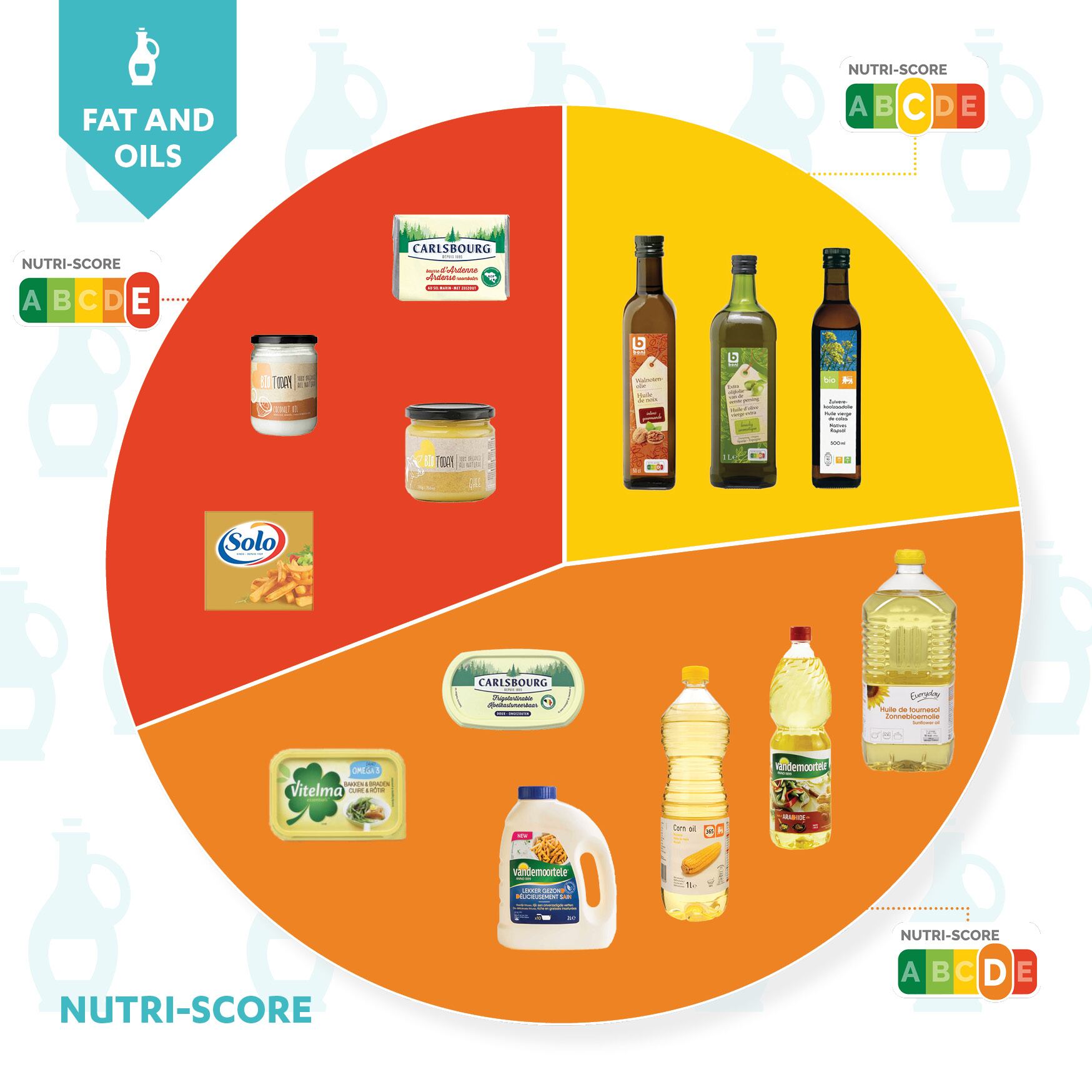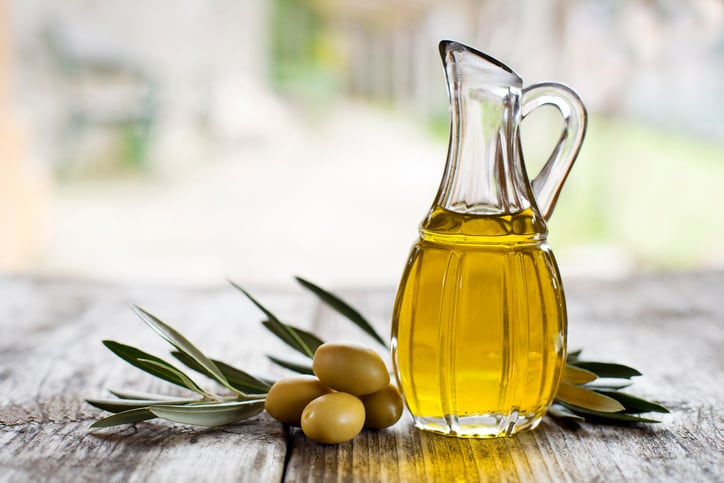Nutri-Score classifies food and beverages according to their nutritional profile using a scale of five colours and letters (A is green to represent the best nutritional quality while E is dark orange to show it’s the lowest).
The front-of-pack nutritional rating label has been officially recommended by health authorities in France, Germany, Belgium, Netherlands, Luxembourg and Spain and is the current favourite to become the EU’s mandatory FOP nutrition label of choice.
Nutri-Score is calculated via an algorithm developed by a team of independent researchers, which takes into account both the nutrients to limit (ie. calories, saturated fat, sugars and salt) and those elements to favour (such as fibre, proteins, nuts, fruit and vegetables) and thus allow consumers to choose the healthy option.
Under the system, olive oil receives a yellow C rating. This, according to members of the olive oil industry, does not take the health benefits of olive oils into due account and ultimately penalises the product.
Therefore, the Center for Advanced Studies in Olives and Olive Oils, based at the University of Jaén in Andalucía, Spain, in collaboration with olive oil producer Deoleo, extract supplier Genosa, packaging firm Tetra Pak and engineering company Alfa Laval, will host the first international Health and Flavor Awards. According to a statement from the organisers, the awards will value for the first time those oils that demonstrate both the ‘best organoleptical qualities and the minimum level of phenolic compounds required by European regulation EC 1924/2006’.
“This controversial nutritional algorithm is confusing consumers by not differentiating olive oil from other oils and even other processed foods,” the organisers said.
“The evaluations of this algorithmic system have been well received in some countries, but it has generated enormous doubts in many others who have been dissatisfied when considering that they seriously harm several foods of the Mediterranean Diet, distorting their true nutritional value.”
'Nutri-Score must be improved'
The awards will accept entrants from around the world. There will be two categories: conventional and organic. Each category will have two subcategories (intense and medium green). There will be two winners per subcategory. The eight winners will be announced at an event scheduled to take place later this year on 14 December. They will receive official recognition by a strict and expertise panel of tasters and will bear the organization's logo on their labels.
Genosa CEO Carlos Peña told FoodNavigator he hoped the initiative will help Nutriscore to ‘rethink the criteria it uses for food. “Nutri-Score can be a good initiative, but we think that must be improved,” he said.
Olive oils containing more than 250 ppm of olive polyphenols, he said, provide healthy benefits on one of the main risk factors associated with cardiovascular diseases, LDL cholesterol oxidation.
“Nutriscore could state that extra virgin olive oils containing such level of polyphenols should have another assessment, like A or B because they really give a clinically demonstrated benefit to consumers.
We understand that it is not easy, but it does not make sense that a chocolate cake or ultra-processed food can have a close assessment value with olive oil. Humans need to consume fats as a source of energy. What about, if for instance, Nutri-Score stated an “A” or “B” if you consumed 20/30 g of these oils with the minimum level of polyphenols? This would meet the EFSA claim and would promote to consumers a food that is really healthy.”
The EFSA-approved health claim on olive oil polyphenols as a contributor to the protection of blood lipids from oxidative stress (Commission Regulation EU 432/2012) may be used only for olive oil containing at least 5 mg of hydroxytyrosol and its derivatives (e.g. oleuropein complex and tyrosol) per 20 g of olive oil. In order to bear the claim, information shall be given to the consumer that the beneficial effect is obtained with a daily intake of 20 g of olive oil.
The awards, added Peña, aim to guarantee “health and flavour” to consumers, while also ensuring farmers can get more value added for oils with more polyphenols. “To achieve higher quality requires more effort and investment [from farmers],” he explained.
The awards further hope to help the development of new packaging technologies to help guarantee the high polyphenol content in olive oils. The General Director of Alfa Laval Iberia, Javier Ortiz, said “We have a clear strategy focused on the development of new technologies that help to preserve the polyphenols in the olive oil extraction process as much as possible. Those producers who struggle to obtain a healthier and higher quality product are valued.”
Nutri-Score in Spain won’t apply to olive oil
It comes as the Spanish government has said that Nutri-Score won’t be applied to olive oil and should be revised as the system is officially introduced into the country later this year on a voluntary basis. “Olive oil is good for your health, and cannot have a label that says it’s bad,” said Minister of Consumer Affairs Alberto Garzón.

‘It’s still a product high in calories and fat and should be consumed moderately’
The consumer organisation BEUC, which wants Nutri-Score made compulsory across the EU, said the current system was fair and would not be altered.
Emma Calvert, Senior Food Policy officer at BEUC, told us: “Olive oil in fact achieves the best score in the fats and oils category (‘C’) compared to butter (’E’) or saturates-rich vegetable oils such as palm oil (‘E’). Therefore, when a consumer is wishing to purchase a fat or oil of a better nutritional quality, they would naturally opt for olive oil as it has the best score any fat or oil can get. As healthy as olive oil can be compared to other such fats or oils, it’s still a product high in calories and fat and should be consumed moderately.
“The reason it therefore achieves a ‘C’ is because the Nutri-Score algorithm, which is based on a very high level of scientific evidence, considers the qualitative amounts of key nutrients in a product. With 1 in 2 European adults overweight or obese, it is urgent the healthy food choice became easier for consumers. Nutri-Score can play an important role in that respect, as it helps consumers to easily compare the nutritional value of foods and to make healthier purchase choices.”





